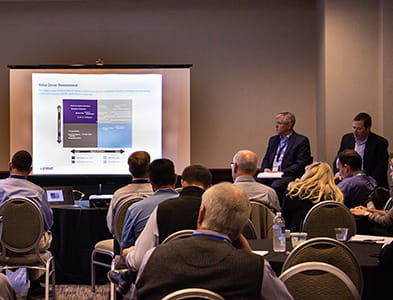What I Wish I Knew About Selling a Business Before I Sold My Business
What I Wish I Knew About Selling a Business Before I Sold My Business
Insights on succession planning, the importance of hiring advisors, different approaches, hindsight, and more.
In a conversation presented at the virtual 2020 MAPP Benchmarking Conference, former business owner Rick Gill spoke candidly with Mike Benson, Managing Director in Stout's Investment Banking group, about their recent shared experience of selling his family’s company, Polyfab, to Japanese buyer, DAIHO.
Mike Benson: One of the most compelling attributes of Manufacturers Association of Plastics Processors (MAPP) is its members’ willingness to share their insights with the goal of helping other member companies improve. Such is the case with Rick Gill, as we reflect on the shared experience of selling the company his parents founded in 1971. Our conversation will cover knowing when it is the right time to sell, the managed sale process, what went well, what could have gone better and, ultimately, some words of advice.
Rick Gill: I was one of the first shop employees when my parents founded the business in Kenosha, WI, in 1971. We started as a plastics company with one machine out of our garage in the middle of a recession, but the business grew significantly and diversified along the way. I became president in 1985 and adopted the philosophy of hiring the best. I strived to put the best possible team around me, which included my brother and sister. The three of us owned the company’s stock, but none of us owned the majority.
A number of factors helped us determine the time it was right to sell. The business was on solid ground; sales and profits were growing, and we had capacity in the plant. We had a strong management team in place, a succession plan that would carry the business forward, and favorable economic conditions. And, I was ready to retire.
MB: I remember spending a lot of time walking you through the managed sale process, getting you comfortable with the various steps and details. For those who have not experienced this, a managed sale process can be broken down into five phases:
- Prelaunch preparation
- Prepare for market
- Initiate the process
- Select a partner and letter of intent
- Consummate the transaction
What many business owners do not anticipate is that prelaunch preparation can start months, even years, prior to selling the business. The actions and mindset embraced prior to selling a business can have a significant impact on the outcome.
One of the things that the Stout team was impressed by was your decision to hire your successor some years ago to transition into the organization and begin running the business prior to initiating the sale process. What were some of the factors in that decision?
RG: I was approaching retirement age, along with several members of our management team. One of the things we understood buyers would evaluate was their ability to run the business going forward. Our goal was for the buyer to keep the existing management team in place. So, we hired Scott Doleshaw. Scott had impressive qualifications and made a great impression on the prospective buyers we met with. Having him in place also freed me to focus on the sale process. Some may have concerns that hiring an additional senior staff member would negatively impact the final sale price. However, we told buyers they could add my salary and benefits back into the business because it would be a savings as soon as they bought the business. My plan was to retire immediately and have Scott fully take over. This was also well received by prospective buyers.
MB: This approach made sense because you knew you wanted to retire. We’ve seen instances in which existing management offers a two- to three-year transition, but it is rarely longer than that. If someone is looking to step away from the business sooner, it can push down the value of the transaction because it introduces risk. It puts the onus on the buyer to find new leadership to run the business and ensure a smooth transition.
RG: We wanted Scott to be very familiar with the business by the time we sold. Scott selected a new Engineering Director after ours retired and made some other, more minor changes on the team. He had a vision of where he wanted to go and how he wanted to do things. As time went by, I became less and less involved. The final step was to transition sales and a few other responsibilities. From then on, he was fully running the business.
MB: When it came to advisors, you hired Stout as an investment banker, and we suggested you also hire two additional advisors – a mergers and acquisitions (M&A) specialist on the legal side and a mergers and acquisitions tax specialist. Tell us why you were skeptical at first and why, in the end, you realized significant benefits from these hiring decisions.
RG: I didn’t understand the myriad of tax ramifications and wrinkles that are part of M&A transactions, so I started to do my own research and heard different answers to the same question. When I finally reached out to the M&A tax specialist you referred me to, he was able to explain not only the right answer but also how and why all the details worked. That was when I realized that this was someone we needed on the team. You also really want an attorney who works strictly on M&A. The contract we signed was 80 pages of details. Those details matter, and so did the additional 80 pages of disclosures. Not only are each of these different specialties, but the sum of the parts was meaningful in reaching consensus and issue resolution throughout the process.
MB: Another decision of yours that paid dividends was, years in advance of a sale, to put together what I call a real board of directors with some outside board members. Talk about what prompted this and what you think the benefits were.
RG: The outside board was a family decision back when my parents were running the business. They had attended a seminar that recommended this approach for family-owned businesses. The board was a value-added resource and brought another level of professionalism to the company. They had industry experience and provided helpful decision-making guidance along the way. The buyers were impressed with this – it was a signal that we take others’ opinions seriously.
MB: Also received well was your willingness to include two of your key sales professionals in the process, including management presentations. Tell us about this.
RG: We had some fantastic salespeople, and I knew they would make a very good impression. We were positioning the company for sale with significant potential for future growth, and our salespeople were at the heart of that. It also put our sales team at ease, knowing they were valued and that the buyers responded favorably to them. The prospective buyers appreciated the opportunity to engage with a broader set of our management. Keith and Boyd did a fantastic job – their genuine enthusiasm about the products and their openness to receiving a new shareholder gave buyers a sense of confidence that this would be a successful partnership going forward.
MB: One of the most important parts of a managed sale process is to make it as competitive as possible – to bring multiple buyers to the table.
RG: It was a complex decision. You presented a great package to us with qualitative and quantitative factors, pros and cons, etc. In the end, it came down to an international strategic hybrid and a pure financial buyer. It is easy to just go for the most money. But, ultimately, it was a private family decision we needed to make. It was important to us to understand how the new owners would treat people after we left and that there would be a strong cultural fit between our business and that of the buyer. We felt that this was extremely important for the company’s ongoing success. We actually went to Japan, and Scott was surprised to see how similar DAIHO’s business was to ours. That brings a lot of confidence to the decision-making process.
MB: I also remember when we met early on that you spoke a great deal about confidentiality. We only saw the facility once, and it was just a quick walk-through. Why was confidentiality so important to you and your family?
RG: The risk of losing confidentiality is twofold – you could lose customers or you could lose employees. A year and a half ago, the economy was really hot – employment was 2% in Sheboygan. Any sort of disruption could lead to the loss of a lot of good people, and we had a hard time finding good people. We did not want to distract our employees or introduce any potential uncertainty in their lives.
MB: Probably one of the most common questions I get from business owners about a managed sale process is: What is the most common reason a transaction does not close? By far, the biggest determinant is when a company does not meet their projections. Fortunately for you, not only did you meet your projections, but you usually beat them throughout the duration of the process, which is fantastic. How did you achieve this?
RG: Scott absolutely remained focused on the business, which is exactly what we needed him to do. You describe me as conservative, but I actually went a little optimistic about our forecast to the point where I made Scott a little nervous. But, we were able to exceed those numbers. I think companies need to be cautious because it is very tempting to start cutting corners and doing things to make more profit; however, that will be doing things differently from how you normally operate. For example, skipping maintenance or not investing in capital equipment. Buyers can see through these actions. It is so important to be completely transparent and run the business the way you always have.
MB: That is a great point, Rick. Switching gears, let’s talk about an area where you could have done things a bit differently – financial statements. In a perfect world, a company would be able to provide multiple years of audited financial statements from a well-known accounting firm. This establishes a reliable track record of performance. It’s nearly impossible to go back in time and recreate these. Rick, can you talk about your sister being the CFO, and why you made the decision to get reviewed but not audited statements along the way?
RG: My sister worked as a CPA before joining Polyfab and brought very broad and deep experience to her role as CFO, so we felt comfortable with reviewed financial statements. But, when you get into a sale process, trust is such an important factor, especially when dealing with an international buyer, because they do not always understand every little nuance of how things work in the US. I think having audited financial statements would have increased the trust factor and would have helped the whole process move much quicker.
MB: Another thing we advise our clients to do is conduct a sell-side quality of earnings, or QofE, as we call it. It is a focused audit of the earnings of the business conducted by an outside firm that sometimes includes EBITDA (earnings before interest, taxes, depreciation and amortization) to verify all adjustments, the balance sheet, and net working capital.
RG: Two things. One reason why the QofE was not as important to Polyfab is that we had always been conservative in how we presented our financials and did not expense things that many private companies tend to expense. We knew our QofE was high going in. There was no smoke or mirrors. Another thing we did was send Carol and Scott to Japan to meet the buyers, recognizing the importance they place on relationships. I do not think the deal would have closed without that.
MB: Another strength was that your team used the Integrated Quality Management System (IQMS), and you, personally, are an expert. Everyone felt good about the fact that you had substantial data. But, it was a bit surprising to you how focused the buyers were on understanding the historical trends. Talk a little about this challenge, knowing it was a painful part of the process.
RG: There was a lot of work involved, and they asked a lot of questions. They wanted to understand the historical trends and wanted to know why volume with a particular customer went up or down and why margins shifted over several months prior. Most times, we could get the information needed to respond, but it was difficult and time consuming. Having that information at the ready, ahead of time, would have been very helpful.
MB: Another item that ideally would have been addressed prior to sale was having a fresh environmental phase one completed by a national environmental consulting firm. How important was a recent and positive environmental phase one to the process?
RG: Yes, we had passed all the standards, but because we were close to the edge, they felt they had to conduct more investigation. Ultimately everything we did was within legal limits, but we did go through several layers of testing, and it was very painful in terms of the amount of effort we had to put into it. It definitely impacted the schedule, and frankly, there was a lot of stress in this process. So, when something like this arises, it is concerning. It did make for some tense moments.
MB: Before we wrap up, let us discuss one more area. You planned to put in place both employment agreements and transaction bonuses for your management. Can you describe your family’s philosophy toward employment agreements and transaction bonuses?
RG: The employment agreements gave managers a sense of comfort that they were going to remain employed under new ownership and that their job was going to be secure. Now, unfortunately, I did not get those employment agreements completed far enough in advance, and this became an issue during the process as we were negotiating. Because they were not complete, the buyer wanted to negotiate their own employment agreements. Ideally, we would have had those agreements locked a year in advance of the sale. My perspective on the transaction bonuses is that they are a thank-you incentive for people to stay until the closing because they do not get paid out until the day of the closing. We also put aside some of the sale price for bonuses for the shop people, which was paid out the day before closing, and it was a complete and pleasant surprise for them.
MB: That had to be one of the best moments of the entire process for you. Overall, while I know you would not describe this experience as fun, I do believe that you found it very interesting and intellectually stimulating. What were some of the biggest surprises for you?
RG: What really surprised me is that I thought I had done my research and prepared myself for everything the process would entail. But, it was much more involved and complicated than I understood it would be. The level of detail during the due diligence phase was astonishing, especially when a month would pass and we would be updating information or asked to provide the same information but through a slightly different lens. I also expected things would slow down at some point, but as we went through the process, the workload grew, and the pace kept getting faster and faster. If you think you know how much work is involved, trust me when I say you are probably underestimating it.
MB: We cannot emphasize preparation enough when speaking with owners who are considering the sale process. It is one of the biggest single factors that drives a successful transaction. And I am not talking months; I am talking years. But, you survived it, Rick, and you were able to retire relatively quickly. What’s life like now that you are on the other side?
RG: The biggest change is that the stress I had from running the business is gone. I sleep a whole lot better at night. I get to spend a lot more time with my bride, and that is a wonderful thing. I have time for hobbies and ministries, and I am actually open to working on some boards, if I can find the right opportunities for that. There are many things to fill my time with, but the pace is much more relaxing.
MB: What is some general advice you can give to business owners who are considering a sale or liquidity event?
RG: The first thing I would say is that honesty is paramount. If you’re stretching the truth or not being honest, not only will it be exposed during due diligence, but it can also derail the process. If trust is lost, the deal will deteriorate.
Another issue is that when you sit down to review the legal terms, there is something called reps and warranties insurance. You have answered everything they asked about your business. However, if any of what you have shared is inaccurate, a buyer can come back and recover some of their investment. The amount is limited unless you commit fraud, in which case there is no limit. It is extremely important to know that there are safeguards in place that protect the buyer.
Finally, you need to think about your story and how you will share it with prospective buyers. Why is your company a good value? How can the buyer grow the business? How might they be more successful with it than you were? Much of that begins long before the sale. We knew we wanted to build a great team. We had a multi-faceted business strategy. Our quality was high in terms of customer turns, and we had a lot of automation expertise. We were also good at growing sales and excellent at customer service. So, there are many things you can do to increase the value of your business, but most of those are things that you do as you grow the business through the years. So, what I would tell people is, do not wait until it is time to sell to start thinking about these things.






